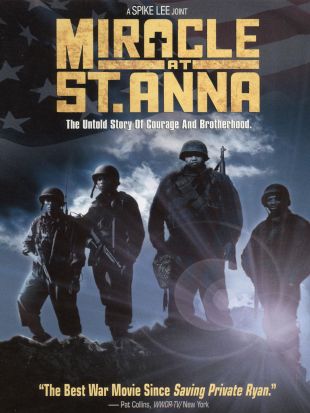
Despite Spike Lee's carefully cultivated reputation as a firebrand and provocateur, his films have always betrayed the heart of a classicist. Directing Miracle at St. Anna, the biggest-budgeted mainstream movie yet about the experiences of African-American soldiers in World War II, doesn't phase the audacious Lee in the slightest. He opens the film in 1983 with the main character watching John Wayne in The Longest Day and responding to the Duke's outsized American-ness with quiet pride (the flip side of Public Enemy's assault on him in "Fight the Power"). Lee addresses the ghosts of both American movies and American history throughout the film's two-hour-and-fourty-minute running time, but what makes the movie work is his commitment to traditional notions of story and character. Miracle at St. Anna is the opposite of a polemic, it's a generous, old-fashioned entertainment. Some long films feel bloated because the director deliberates over the grand themes, but Miracle at St. Anna clocks in at 160 minutes simply because, like a great beach novel, it's chock-full of story. The elaborate -- but never confusing -- plot involves a ghost, Italian resistance fighters, a love triangle, racial prejudice, war atrocities, and priceless artifacts. The movie adopts a novelistic approach where the sequences play like chapters that each develop the characters and the various storylines simultaneously, without once confusing or boring the audience. Screenwriter and novelist James McBride deserves credit for the elegant structure, but Lee and his editor can take a bow for giving each sequence weight without hampering the film's flow. Thankfully, every aspect of the production is as spot-on as the structure: Terence Blanchard's score alternates between aching beauty and martial intensity, Matthew Libatique's cinematography is varied and engrossing, and Lee's compositions continually showcase his innate ability to express sensuality -- the man knows how to photograph people. Everybody involved gets a moment to stand out, but none of the individual excellence announces itself with signs of "Look at how important all of this is!" pretentiousness. This is an unapologetically emotional, confident, and entertaining movie that is by turns funny, heartbreaking, shamelessly tearjerking, and nail-bitingly tense. The film could be mistaken for being nothing more than Oscar bait -- aggressively middle-brow fare that seems "important" simply because it tackles such weighty themes -- but Lee is far too idiosyncratic a filmmaker to strive for something as banal as that. Instead, Miracle at St. Anna feels exactly like the kind of film Spike Lee himself would enjoy watching, and the man does have excellent taste in movies.
